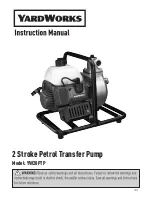
– 43 –
Compressor Resistance Test
Remove the leads from the compressor terminals
and set to the ohmmeter on the lowest scale.
Touch the leads of the ohmmeter from terminals
common to start ("C" to "S"). Next, touch the
leads of the ohmmeter from terminals common to
run ("C" to "R").
In a compressor motor, the highest value will be
from the start to the run connections ("S" to "R").
The next highest resistance is from the start to
the common connections ("S" to "C"). The lowest
resistance is from the run to common. ("C" to "R").
Before replacing a compressor, check to be sure
it is defective.
Ground Test
Use an ohmmeter set on its highest scale. Touch
one lead to the compressor body (clean point of
contact as a good connection is a must) and the
other probe in turn to each compressor terminal.
If a reading is obtained, the compressor is
grounded and must be replaced.
Complete evaluation of the system must be made
whenever it is suspected that the compressor is
defective. If the compressor has been operating
for some time, a careful examination must be
made to determine why the compressor failed.
Many compressor failures are caused by the
following conditions:
•
,PSURSHUDLUÀRZRYHUWKHHYDSRUDWRU
•
Overcharged refrigerant system causing
liquid to be returned to the compressor
•
Restricted refrigerant system
•
Lack of lubrication
•
Liquid refrigerant returning to compressor
causing oil to be washed out of bearings
•
Non-condensables such as air and moisture
in the system. Moisture is extremely
destructive to a refrigerator system
Summary of Contents for GE Vertical Zoneline AZ90E09D C
Page 48: ...48 Schematic...









































